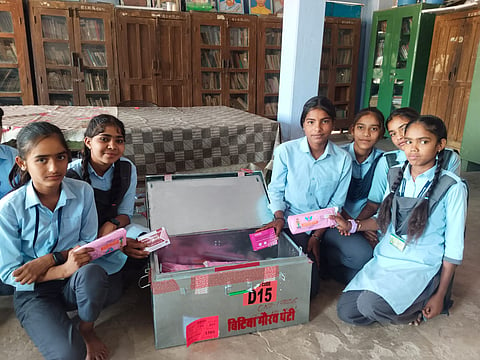
Jaipur- In Rajasthan’s Jaipur, a collector’s small yet visionary idea has sparked a significant change for girls. Once sold off as scrap at auctions, the boxes used in competitive exams are now being transformed into 'Bitiya Gaurav Peti' (Daughter’s Pride Box), bringing hope and support to students in girls’ schools. This initiative not only redefines resource utilization but also sends a powerful message about honoring and prioritizing the needs of daughters.
In the past, these boxes had a predictable fate—auctioned off at meager prices after their use in exams, yielding little value for the administration. However, the Jaipur District Collector Jitendra Kumar Soni turned this tradition on its head with an innovative approach. Instead of auctions, these boxes are now being repurposed and sent to PM Shri girls’ schools and hostels in Jaipur.
Painted in vibrant colors and christened 'Bitiya Gaurav Peti,' they are filled with essentials like sanitary napkins, vitamin D supplements, medicines, and daily necessities.
Placed in schools, these boxes ensure girls can access what they need without hesitation. Speaking with The Mooknayak, Collector Jitendra Kumar Soni said, " It is not just about utilising resources but a small gesture to let our daughters know that they are been taken care of and they are our priority". The Women and Child Development department is overseeing the project.
The campaign has already seen the preparation of over 1,000 'Bitiya Gaurav Peti' boxes, with some fifty percent of these distributed so far. Each box is labeled 'Bitiya Gaurav Peti' and designed to catch the eye. The district administration has instructed school principals to ensure their proper use and share photographs of their implementation.
Rajesh Dogiwal, Deputy Director, Women Empowerment, Rajasthan, shared with The Mooknayak, "About 50 percent of the boxes have reached schools, and the rest will be dispatched this week. Weighing 15-20 kilograms, these boxes once fetched paltry sums at auctions, but now they’re making a huge difference for girls."
Beyond providing convenience, this initiative aims to boost the confidence of young girls. With these boxes stationed in schools, students can easily access sanitary pads or medicines whenever required.
School principals have been instructed to ensure the proper use of these boxes and to send photographs of their utilization to the administration via email. The District Education Officer has also been directed to provide guidelines to schools for the appropriate use of these boxes.
Dogiwal added, "We’ll collect feedback on this campaign and plan to extend it to other districts. In the next phase, these boxes will reach Anganwadi centers." What began as a small step is now blossoming into a larger story of health, dignity, and empowerment for girls.
This isn’t the first time the Jaipur collector has shown ingenuity. Earlier, the 'Bitiya Gaurav Dashboard' program celebrated talented girl students by featuring their achievements. Now, 'Bitiya Gaurav Peti' builds on that legacy. Where auctions once marked the end of these boxes’ journey, they now pave the way for girls’ welfare and recognition.
The story of 'Bitiya Gaurav Peti' proves that even modest ideas can leave a lasting mark on society. By turning scrap-priced boxes into tools of empowerment, the Jaipur administration has not only given new life to resources but also underscored that daughters deserve pride and priority at every step. This initiative is well on its way to becoming an inspiring model for the rest of Rajasthan.
In 2020, when Jitendra Kumar Soni took charge as the District Collector of Nagaur, his first mission was to ensure that rural residents could easily access every corner of the city. To achieve this, he launched the 'Raasta Kholo Abhiyan' (Open the Path Campaign), aimed at removing encroachments and illegal land occupations.
Police stations were flooded with complaints about blocked pathways and encroachments, yet no action had been taken. These areas lacked proper roads, consisting only of land registered under the Revenue Department, forcing people to take long detours to reach their destinations. On July 31, 2020, the first phase of the campaign cleared 38 pathways. Working alongside Panchayat Samitis and local police, the paths were cleared, and 'patikas' (stone markers) were installed, inscribed with the path’s name and construction date.
Soni didn’t stop at merely opening the pathways. He devised a unique strategy to prevent them from being blocked again. These paths were named Divya Path and dedicated after girls from the villages who had excelled in education or sports. Soni explained, "This was a small gesture of respect toward women and an emotional appeal to encourage people to follow the rules. The patikas not only carry details about the path but are also equipped with a GPS tracking system that alerts the police if tampered with." This initiative not only opened up pathways but also set the achievements of girls as an inspiring example for society.
You can also join our WhatsApp group to get premium and selected news of The Mooknayak on WhatsApp. Click here to join the WhatsApp group.